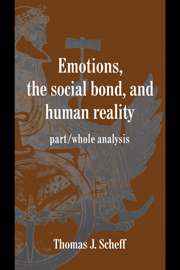Book contents
- Frontmatter
- Contents
- List of figures
- Acknowledgments
- Introduction
- Theory and method
- 1 Part/whole morphology: unifying single case and comparative methods
- 2 The limits of literary analyses of texts
- Generating theory: the social bond
- Generating theory: emotions and conflict
- Appendix
- References
- Index of authors
- Index of topics
- Studies in Emotion and Social Interaction
2 - The limits of literary analyses of texts
Published online by Cambridge University Press: 22 October 2009
- Frontmatter
- Contents
- List of figures
- Acknowledgments
- Introduction
- Theory and method
- 1 Part/whole morphology: unifying single case and comparative methods
- 2 The limits of literary analyses of texts
- Generating theory: the social bond
- Generating theory: emotions and conflict
- Appendix
- References
- Index of authors
- Index of topics
- Studies in Emotion and Social Interaction
Summary
This chapter provides a preliminary example of one use of part/ whole thinking: the framing of a study in a way that positions it within the larger contexts of which it is a part. This is always a crucial issue for scholars both as individuals and as members of scholarly disciplines. What are the advantages of relating your own particular study to larger contexts? And to what lengths should one go in this direction? What are the advantages and disadvantages to limiting of the context to frameworks of one's own discipline? These are quite general questions that apply to all research, and raise complex issues about the costs and benefits of insularity and universality. In this chapter I illustrate the problem with two studies, each of which traverses only a few steps of the part/whole ladder.
Most studies in the human sciences concern either parts or wholes, but seldom include both. Typically, empirical studies focus on parts, theoretical discussions on wholes. There is a standard format in experimental social psychology, for example, which deals with theory only tangentially, as low-level generalizations. These generalizations are usually phrased in the vernacular, rather than in terms of concepts which are bound to some general theory. Because of this format, the same results tend to be found in different contexts, leading to senseless repetition. The Asch studies produce a flood of similar studies, finding conformity in many different settings.
- Type
- Chapter
- Information
- Emotions, the Social Bond, and Human RealityPart/Whole Analysis, pp. 53 - 68Publisher: Cambridge University PressPrint publication year: 1997



